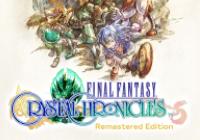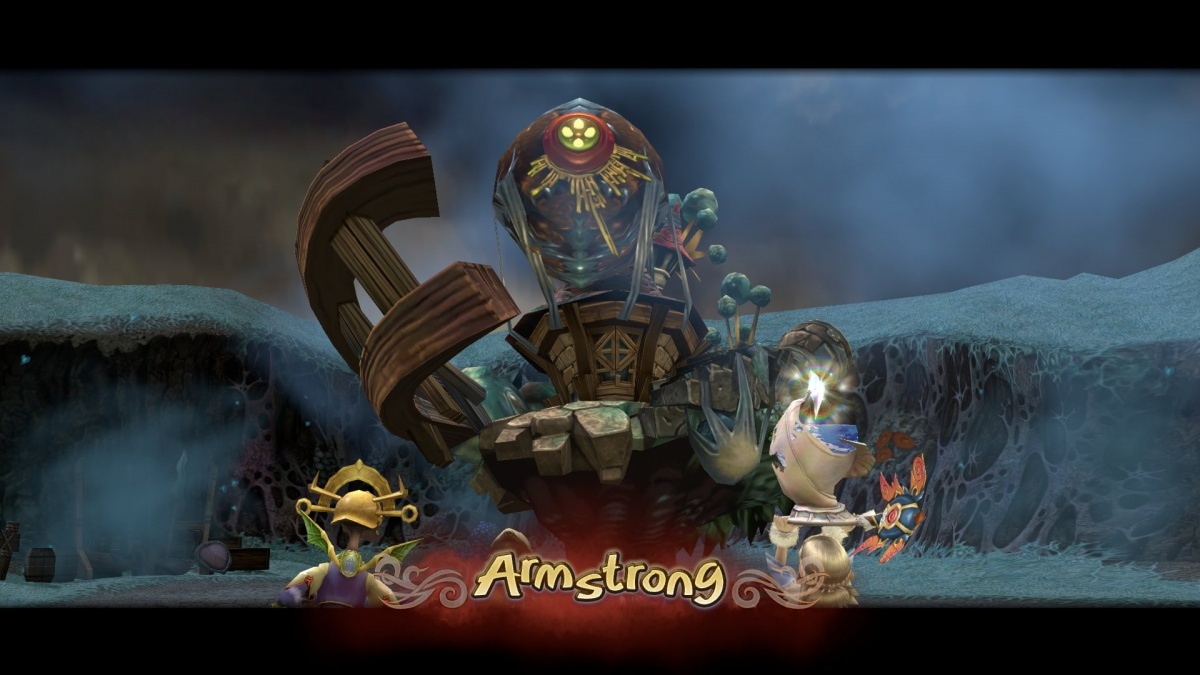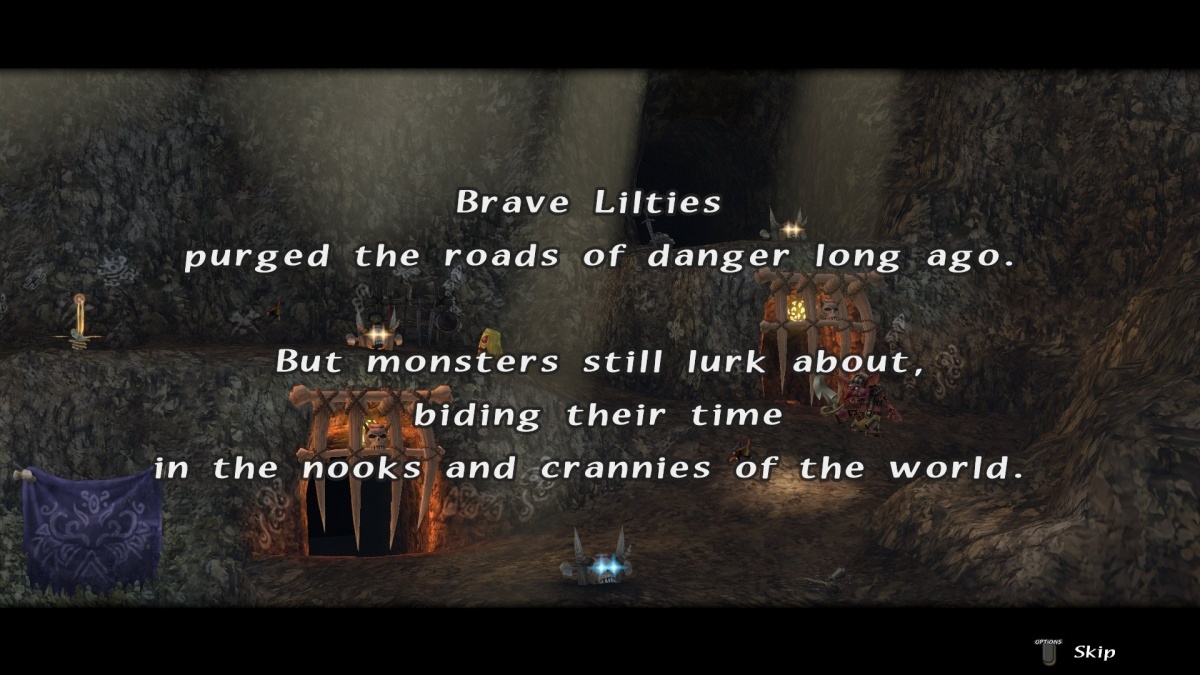Final Fantasy Crystal Chronicles Remastered Edition (PlayStation 4) Review
By Az Elias  08.11.2020
08.11.2020

Square Enix's big return to Nintendo home consoles was incredibly exciting for anyone that was a fan of the Final Fantasy series. What GameCube owners were presented with seventeen years ago, though, was markedly different to anything the RPG giant was putting out on PlayStation platforms. This was no numbered entry in the franchise, nor even a strategic turn-based game of any kind. Final Fantasy Crystal Chronicles took an action-oriented route, albeit in a totally fresh way that befitted Nintendo's gimmicks at the time. Many have fond memories of this rather original take on the famed series, including this here reviewer, but has Square Enix given it the makeover it deserved?
Final Fantasy Crystal Chronicles Remastered Edition has indeed been out a good couple of months on the four platforms it has been released for: PlayStation 4, Nintendo Switch, iOS, and Android. There are no two buts about it: this 2020 revival needed more work done to it. Therefore, with the announcement that Square Enix had been listening to fans and planned an update in the weeks following launch, it would seem only fair to await the patch and see whether things really did improve. Sadly, not a lot has changed, and many will have already finished and moved on at this point, anyway.
Nostalgia can cloud someone's judgement quite well, it seems. Personally speaking, fond memories exist of the time spent with the original on GameCube. Coming back today in this remaster, however, shows Square Enix did little to bring Crystal Chronicles into the modern age - and it drags down what should have been a very enjoyable experience with friends.
Taking advantage of the ability to hook up a Game Boy Advance portable console to the GameCube, Final Fantasy Crystal Chronicles centred heavily on local multiplayer, emphasising the joint adventure the player and their friends were on, and incorporating teamwork into the gameplay. The only way to play multiplayer was in this format - an expensive endeavour that cried out for a future without controller cables and with online play. For sure, although the whole game could be enjoyed by going it solo, group adventuring was primarily what the game had been built around, and, indeed, where it thrived.

The narrative is not front and centre of this Final Fantasy title, although that is not to say it does not have one. The world is covered in a deadly gas known as miasma, and every village sends brave villagers to traverse lands in their crystal caravan, defeating monsters and collecting drops of myrrh, which power the sacred crystals that protect these towns and cities from the poison outside. Creating a custom character, choosing from one of four races (of which their various strengths and weaknesses aren't portrayed until you play as them for yourself), you must venture out on annual quests to retrieve three drops of myrrh, progressively reaching new areas and attempting to put an end to the spread of miasma.
There is nothing to sing and dance about with this story. It is about as bog standard as it gets as far as Japanese role-playing games go, with themes of love and family coming out much later. There are pieces of lore spread about that various villagers and ancient texts reveal, but one would imagine it is subsequent games in this spin-off series that delve more into the snippets of detail present here. Depending on what the individual is looking for in an action RPG, this may or may not suit, but it must be said that this is not the typical level of storytelling Final Fantasy is known for.
There are multiple areas Square Enix needed to rework in this remaster, but it is bizarre how little the developers did to prevent Crystal Chronicles from being the frustration it sadly is. Whether playing solo or multiplayer, a crystal chalice is with you at all times on the field. This creates a safe zone that each character must stay in; stepping outside will cause the miasma to drain your health. That means one person must do the job of carrying the chalice wherever the party goes in each dungeon crawling stage - incredibly annoying for anybody that does not like to walk around doing nothing in their games.

For the solo adventurer, a trusty, familiar Final Fantasy companion in the form of a moogle carries the chalice for you, following the character around automatically, albeit at a much slower pace than a real person would move with it. Does the moogle move quicker than it did on the GameCube version? Hard to say without having the original to hand, but the very fact it is as slow as it is is enough to be a problem, exacerbated by the fact the creature tires out quickly and almost comes to a complete halt, constantly dragging down the gameplay.
The action is simple when it comes to exploring each level, and vast amounts of the game consists of smacking the A button to do a basic attack, timing up to three quick sword slashes (or whatever other weapon is equipped) with a few rhythmic presses. There is nothing wrong with a bit of simplicity, and that's why it can be argued Crystal Chronicles can be quite appealing for the average casual and RPG-curious player, especially for those that want to try to get their buddy or spouse or grandma (okay, maybe not) to join in with them. Unfortunately, where things are easy to understand, other key areas are not.
Magic is picked up in levels by defeating enemies, and these do not carry over to the next stage. If a player picks up some fire magic, that must then be equipped in the menu, and it can then be charged up and used immediately. What is strikingly strange is the control setup, however. The A button performs every single command, but to use a specific ability, it must be cycled to using the shoulder buttons, and then activated. Instead of any sort of button customisation at all, or even Square Enix being thoughtful and updating this bizarrely outdated control scheme, everyone is forced to tap the shoulder buttons to the desired magic, item, or other command (e.g. attack or defend), and then press A to perform that action.

Cumbersome is not the word. By the time you have manoeuvred to the defend command to block an attack, well, it's already over, and simply sticking with the attack command and moving out of the way to initiate a counter attack would be best. There are several unused buttons on the controller, and to not see this remaster take advantage of that and improve this ancient setup is disappointing.
Magic fusion is an interesting twist and encourages communication between players. Charging different spells and overlapping their area of effects can unleash a different spell, such as gravity or holy. With some enemies and gates requiring to be hit by certain fused magic, it is a necessary part of the game that can be both fun to get right and a major pain in the backside, especially in single-player when relying on the moogle to throw out the attack you want.
That said, with multiplayer and some pals by your side to communicate with, this isn't such a problem, right? Wrong.

Turns out Square Enix decided to remove local multiplayer of any kind for this remastered edition. It is almost sacrilegious to even think about. Forget finally looking forward to playing this with that buddy, spouse, or grandma…unless they have their own copy and can go online. However, where one component was removed, another was gained. Crystal Chronicles Remastered does indeed feature online multiplayer with randoms and friends… but more maddening decisions cause things to fall apart.
For one thing, online play is region locked and limited to the store you bought the game from. That rules out playing with buddies across the Atlantic unless you both ensure you get the game from the same digital storefront. Not only that, but it does not make use of the system's built-in friends list at all and opts to use an ID system exclusive to the game itself. Then there is the real kicker: only the host makes in-game progress and receives the drop of myrrh after end-stage bosses are defeated.
Now, Square may have its reasons for why only the host makes progress, but one cannot deny how absurd this is even for when a group of friends are playing together. If you had any plans of working through the story with even just one buddy, you must take it in turns to beat the same stage to ensure you all receive that story-advancing crystal droplet. That means, for a team of four mates to advance at the same pace, the same level must be beaten four times. For a game that sold itself on its group journey premise, everything feels completely mismanaged when it turns out the best way to play is solo and by joining randoms online to quickly replay stages for rewards. Still, at least cross-play with other system players is a thing.

Ignoring the constant network errors and need to retry to get into the lobby section, Crystal Chronicles was not made for working through with online strangers. It becomes difficult to communicate with the pre-set text messages in attempts to get specific fused magic to be cast, and every player being forced to wait at the end of a level while the host receives and replies to a letter from their hometown family exemplifies how wrong it all feels. Perhaps one bonus is that it is much quicker to upgrade a character by hopping into an on-going lobby and hopefully claiming a stat-boosting reward or rare crafting material out of it, but that is about it. Without the ability to play locally or even with friends from afar without workarounds that players should not have to do, the magic is lost.
Longer load times than the original GameCube version, an incredibly slow user interface and map screen, repeated and random story scenes when landing on different map points… There is a combination of dated design and a total lack of want from Square to bring this into the current age at all. Throw in some day one DLC, reskinned stages as post-game content, and it is obvious how much the publisher really cared, especially when there is no doubt that the mobile versions held back the need to vastly improve many areas on console. For all the delays and time this was in development, it is disheartening to see this oft-forgotten Final Fantasy entry treated this way, even turning out worse than the original with its lack of local multiplayer. Square Enix really should have dropped the mobile versions and given this the proper remastering or remake it deserved.

Cubed3 Rating
Subpar
It pains to criticise this remaster so harshly, because there was a great fondness for the original title that sprang to life if local multiplayer with friends was taken advantage of. Square Enix has shown little desire to give Final Fantasy Crystal Chronicles the makeover it deserved, however, and its many dated issues only become more apparent next to the removal of local multiplayer and region-locked online play. There is still a case for chancing it with friends that enjoy dungeon crawlers and can deal with the limitations, but beware of the strange control schemes and tedious gameplay.

![]() 4/10
4/10
![]() 0
(0 Votes)
0
(0 Votes)
 Out now
Out now  Out now
Out now  Out now
Out now  Out now
Out now Comments
Comments are currently disabled

 Sign In
Sign In Game Details
Game Details Subscribe to this topic
Subscribe to this topic Features
Features






 Top
Top

